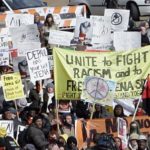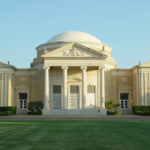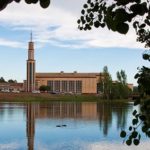The apparent unmitigated spread of COVID-19 should give us pause to consider the welfare of the city.
God spoke to exiled Judah through the prophet Jeremiah, saying: “Seek the peace and prosperity of the city to which I have carried you into exile. Pray to the LORD for it, because if it prospers, you too will prosper” (Jeremiah 29:7).
We can argue whether or not these words were specific to Judah exiled in Babylon or if they also apply to today. If these words apply to us today, we can argue whether or not Christians are people in exile. But in our arguing—which is a distraction—let us not lose sight of the character of God contained in the words “seek the peace and prosperity (the welfare) of the city.”
The concern gripping the world as COVID-19 spreads can give way easily to the sort of fear that drives us to argue with one another. But we don’t have that luxury. Now is the time to seek the welfare of “the city”—because we’re all living in it.
Welfare and scarcity
We have to be honest that the word “welfare” is not well-regarded in our society. For opponents of welfare, it is a matter of justice—“he who works not eats not.” We’ve been taught people who “get on welfare” lack education, self-control, responsibility or principles. For many, welfare is a racially charged word.
Ronald Reagan, knowing how people felt about welfare, made famous the caricature of the “welfare queen” in a 1976 campaign speech, further entrenching the popular conception of a person on welfare. Politicians ever since have promised to get people “off of welfare.”
In light of all of this, we may read God’s words in Jeremiah with a great deal of skepticism. One reason for skepticism is because our understanding of welfare is predicated on our belief that there isn’t enough to go around. We react to the suggestion of seeking the welfare of the city from a position of scarcity. We may also consider it unjust to give “handouts” to those who haven’t worked for it.
The bottom line: We don’t want anyone taking advantage of us. We don’t want anyone gaming the system. We don’t want to be cheated, and we certainly don’t want to go without while watching someone else go with what we think ought to be ours.
In our scarcity mentality, we’re going to get ours; too bad for the next person.
Sign up for our weekly edition and get all our headlines in your inbox on Thursdays
Is that what God meant by seeking the welfare of the city?
The prospect of disease testing our prosperity
For the last few days, we’ve been trying to find dust masks to use on a spring break mission trip. We want to keep construction dust out of our noses, mouths and lungs. Due to panic buying—a fear of being caught without—there are no masks to be found. I looked for alternatives. One supply company employee told me all their masks—of any kind—are on backorder for “pandemic supply.” That’s what she said.
Masks aren’t the only things in short supply lately. I haven’t looked for any hand sanitizer, but I’ve heard it’s hard to find. Toilet paper, too.
I assume people are stocking their homes with this stuff, and I wonder how freely they will share it if or when the need arises. Will those who’ve been stocking up share from their abundance?
I can hear some readers saying: “Why should they? You should have gotten to the store sooner. Stop your whining.”
That’s just the kind of thing people say who are afraid they don’t have enough, not for others, but for themselves. I can say that because I’ve thought it: “Why should I share? I got to the store first.”
If we’re going to seek the welfare of the city, we’re going to have to get over the idea we will come up short if we let someone else have what we have. We’re going to have to realize what prosperity we have is far more than material; it’s a prosperity of spirit.
Seeking welfare in a sick world
Part of God’s point in telling Judah to seek the welfare of the city was that they were going to be in Babylon a while; so, they needed to make the best of it. Likewise, whether Christians are living in exile or not, we’re going to be in this hurting world for a while. What are we going to do to make the best of it?
Yes, we can pray for the peace and prosperity of the places in which we live and work. But God instructed Judah to do more than pray. God said, “Seek.”
Seek is an action word. To seek is more than folding our hands and bowing our heads. Seeking is going out into the world, turning over every rock, looking for what is missing. When God says, “Seek,” God means don’t stop looking until you find it.
Right now, in this world gripped by fear of disease and poverty, what is missing is a sense of peace and prosperity. What the world needs now more acutely than “love, sweet love” is for us to seek the peace and prosperity—the welfare—of “the city.” And yes, just as Judah was to seek the welfare of people they thought didn’t deserve it, so are we.
The present, and the likely future, are calling for a concrete expression of an abstract reality. The abstract reality is Christians serve the God to whom all things belong and from whom comes every good and perfect thing. When we remember that, we realize we are all “on welfare.” We’ve all received something we didn’t work for, something good we don’t deserve.
We can make that abstract reality concrete by sharing our material abundance at a time when we expect many people to suffer—physically and/or financially.
Gone are the days when someone else’s problems weren’t ours. We live in a fast-paced and interconnected world. In a matter of weeks, someone else’s problems become ours, sometimes in a matter of days. It really is a small world after all. So small it’s like a big city, and we’re all living in it.
It’s time to seek the welfare of the city.
Eric Black is the executive director, publisher and editor of the Baptist Standard. He can be reached at [email protected] or on Twitter at @EricBlackBSP. The views expressed are those solely of the author.
Helpful links to information about COVID-19
A Coronavirus Guide for Texas Baptist Churches
https://texasbaptists.org/response/covid-19/guide
Centers for Disease Control and Prevention
https://www.cdc.gov/coronavirus/2019-ncov/index.html
Baylor Scott & White Health
https://www.bswhealth.com/Pages/coronavirus-information.aspx
U.S. Department of State














We seek to connect God’s story and God’s people around the world. To learn more about God’s story, click here.
Send comments and feedback to Eric Black, our editor. For comments to be published, please specify “letter to the editor.” Maximum length for publication is 300 words.